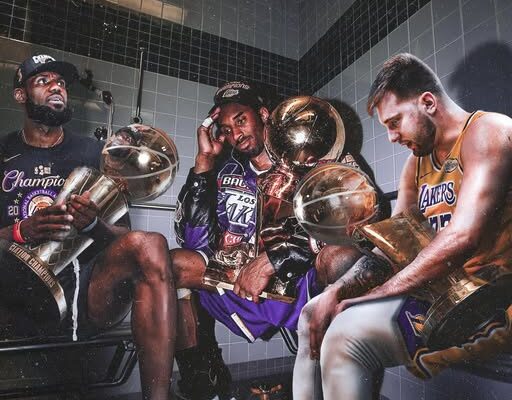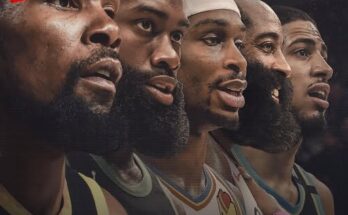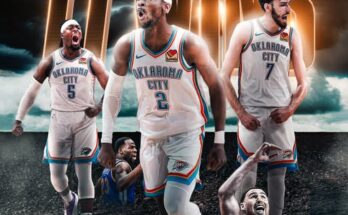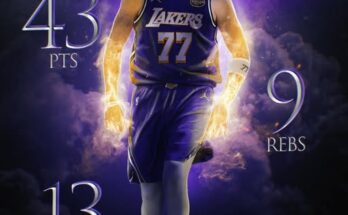Luka Dončić on bringing a championship to Los Angeles—there’s a weight in those words that goes beyond a simple quote, beyond a media sound bite, beyond the daily rhythm of NBA chatter. When he says, “Kobe brought so many championships here. LeBron brought a championship here. So I want to be the next one to do that, for sure,” he’s not just making a declaration. He’s placing himself inside the lineage of one of the league’s most mythic franchises, stepping into a story that began before he was born and that shaped the very dreams he chased across continents, cultures, and childhood years. There is something almost cinematic in the way he speaks about meeting Kobe, playing with LeBron, and growing up oceans away from Staples Center—now Crypto.com Arena—yet feeling its gravity from Slovenia as a kid who just wanted to “touch the NBA.” That phrase alone shows how far he’s traveled, not just geographically but spiritually, professionally, and personally. He went from dreaming of brushing the edges of the league to imagining the center of its brightest spotlight as home. And now he is there, or at least on the edge of it, looking forward, believing he can be the next great Laker to hoist a trophy.
You can feel the humility in the way he talks, but also the hunger. He doesn’t speak like someone who believes he deserves it simply because he’s talented. He speaks like someone who has watched greatness, studied it, and now wants to earn the right to contribute to its ongoing narrative. The Lakers are not just a franchise; they’re a mythology written in banners. Their history includes eras defined by singular figures—Magic, Kareem, Kobe, Shaq, LeBron. When Luka mentions Kobe and LeBron in the same breath as the dream he now carries, he’s recognizing how enormous the footsteps in front of him are. He’s acknowledging the standard, not shrinking from it. And if anything, that makes his ambition feel even more real.
LeBron’s presence in his life adds a layer of surrealism he doesn’t hide. Imagine growing up watching LeBron dominate the league, redefine what a basketball superstar looks like, and then eventually sharing a court with him—not just as an opponent, but potentially as a teammate, mentor, or partner in the quest for another championship. He says, “I’m playing with LeBron, just as a little kid in Slovenia, I just wanted to play basketball.” There’s something profoundly human in that. It reminds you that even the most gifted athletes, the ones whose talent feels predestined, often start from simple hopes: wanting a ball in their hands, wanting a shot at something bigger than their hometown gyms, wanting to see if their passion could lead somewhere extraordinary.
For Luka, extraordinary didn’t just happen. He created it, step by step, team by team, stage by stage—from Real Madrid to Dallas, from prodigy to superstar. And now he imagines the next chapter, one painted in purple and gold, one framed by rafters hung with legends whose ghosts still shape every game played inside that building. When he talks about wanting to be “the next one to do that,” he’s not saying he wants to be Kobe or LeBron. He’s saying he wants to add to what they built. He’s saying he wants to contribute to a legacy that extends beyond individual brilliance. Championships are never only about players; they are about eras. And Luka, with all his creativity, swagger, and competitive fire, speaks like someone who is ready to carve out an era of his own.
There’s a beautiful continuity in the way he connects his past to his future. Meeting Kobe isn’t just a story he’s retelling; it’s a moment that clearly meant something to him, something that he now carries with him the same way countless young players carry their encounter with their idols. Kobe’s influence transcends team lines, transcends generations. For Luka, who was still a rising star when Kobe passed, that encounter becomes even more meaningful. It becomes something sacred—something that changed the trajectory of how he sees this game and the responsibility that comes with being one of the best in the world. Playing with LeBron is the other side of that same coin. Kobe represents the past, the foundation, the legendary expectation. LeBron represents the present, the living embodiment of basketball excellence, someone he not only admires but actively learns from. Luka stands between them, looking forward, trying to imagine how he can be worthy of both the memory and the moment.
His words also carry the tone of someone who understands how rare his opportunity is. Not everyone gets a chance to win a championship, let alone win one for a franchise where winning is the expectation, not the exception. Not everyone gets to feel that pressure and still embrace it with a smile, still speak of it as a dream rather than a burden. That may be the most compelling thing about Luka: he loves the game in a way that’s obvious every time he steps on the court, and he loves the challenge that comes with being great. He doesn’t sound intimidated. He sounds energized. He sounds like someone who sees history not as something to fear but as a challenge to meet.
In Slovenia, he imagined touching the NBA. Now he imagines lifting a trophy that millions of fans believe belongs in Los Angeles more than anywhere else. That shift from dreamer to doer to legacy-builder is a trajectory few athletes experience, fewer still articulate with this level of self-awareness. His ambition doesn’t feel forced or dramatic. It feels natural, like the next logical expression of who he has become. It feels like the culmination of all the work, all the miles, all the nights he spent perfecting his craft so that if he ever reached this point—if he ever found himself with a chance to chase something monumental—he would be ready.
And when he says he wants to be the next one to bring a championship to Los Angeles, there’s gratitude behind it. Gratitude for Kobe’s inspiration. Gratitude for LeBron’s mentorship and presence. Gratitude for the kid he used to be, the one who just wanted to dribble a ball and see how far it could take him. Gratitude for the opportunity to dream at a scale he never imagined possible. Gratitude for the fans who believe, the teammates who trust him, the coaches who push him, and the moment in front of him that feels both overwhelming and exactly right.
Luka’s story is still being written. His chapter in Los Angeles—if that is in fact where his path leads—would be part of something larger than himself, yet uniquely shaped by him. That’s what makes his words so compelling. He’s not making a promise he can’t keep; he’s expressing a desire that fuels him. He’s speaking into existence a dream that aligns with everything he has already shown he can do. He wants to be the next great Laker champion not because he needs the validation, but because he loves the game enough to chase greatness wherever it leads. He loves the idea of contributing to a franchise with a history as rich as the sport itself. He loves the challenge of stepping into a legacy defined by icons he once watched from thousands of miles away.
And somewhere in that mix—somewhere between Slovenia, Dallas, Los Angeles, and the countless arenas in between—Luka Dončić remains the kid who picked up a basketball because it felt like magic in his hands. That kid is still inside him, still dreaming, still believing, still ready to surprise the world with what he can do. That kid is the reason he speaks with such wonder about meeting Kobe and playing with LeBron. That kid is the reason he believes a championship is not just possible but part of his destiny.
In the end, Luka’s words are not just about ambition; they are about gratitude, legacy, love for the game, and a belief that greatness is earned by those who dare to chase it with everything they have. If he does bring a championship to Los Angeles, it will not be by accident. It will be the fulfillment of a dream that began in a small corner of Slovenia and grew with every step, every shot, every moment of inspiration from the legends who came before him. And if he doesn’t? The journey itself will still be extraordinary, because it is fueled by genuine passion—not entitlement, not obligation, but pure love for the sport and the story he is trying to write.
But listening to him talk, it’s hard not to believe that someday, somehow, he just might do it.



